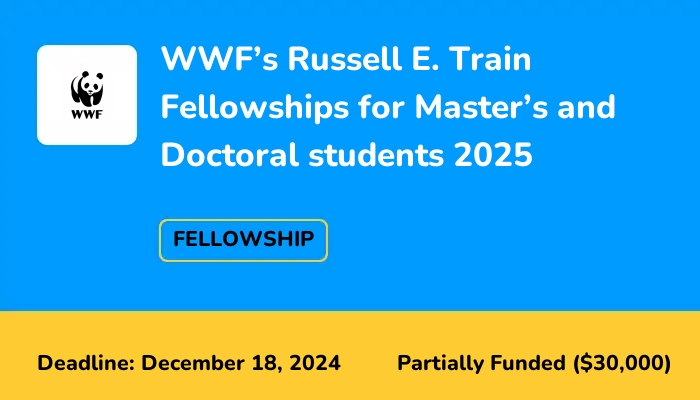Russell E. Train Fellowships support individuals pursuing a master’s or doctoral degree in conservation and related fields. Each year, WWF supports committed conservation leaders and scientists from target countries to receive financial support for their studies and research.
About World Wildlife Fund (WWF)
WWF was established in 1961 by a group of passionate and committed individuals who sought to secure the funding necessary to protect places and species that were threatened by human development.
Inspired by a series of articles in a UK newspaper written by Sir Julian Huxley about the destruction of habitat and wildlife in East Africa, businessman Victor Stolan pointed out the urgent need for an international organization to raise funds for conservation. The idea was then shared with Max Nicholson, Director General of British government agency Nature Conservancy, who enthusiastically took up... continue reading

Subscribe for scholarship update!
Be among the first to know whenever new World Wildlife Fund scholarship is going on. Enter your email address and click the Subscribe button ↓
WWF’s Russell E. Train Fellowships
Aim and Benefits of WWF’s Russell E. Train Fellowships
Applicants will benefit the following:
- The Russell E. Train Fellowships provide financial assistance for individuals pursuing a master’s or doctoral degree in conservation and related fields, with funding up to $30,000 per year for up to two years.
- The WWF Food Systems Fellowship aims to support exceptional students in developing innovative, evidence-based research focused on the national dimensions of food systems and transformation.
- Fellows will join the extensive global network of EFN alumni, facilitating knowledge exchange and collaborative success in their research efforts.
Requirements for WWF’s Russell E. Train Fellowships Qualification
Applicants are to meet the following criteria:
- You must be a citizen and legal permanent resident of an eligible country.
- You should preferably have at least two years of conservation-related work or research experience.
- You must demonstrate a commitment to working in conservation in an eligible country.
- You must be enrolled in, admitted to, or have applied to a Master’s or PhD program anywhere in the world.
- You must plan to begin your studies no later than January 2026.
- If you are a WWF employee, consultant, or previous EFN grant recipient, you must contact EFN to determine eligibility.
- You must submit all required documents by the application deadline (December 18, 2024).
Interview date, Process and Venue for WWF’s Russell E. Train Fellowships
Selection
- The applicant must demonstrate a commitment to academic and professional development.
- The research proposal should be unique, relevant, and include a detailed plan of action. It should show an understanding of the fellowship’s goals and focus on food systems and transformation.
- The proposed work must have potential for short- and long-term conservation impacts and engage diverse stakeholders, including local and indigenous communities and gender mainstreaming.
- The research should have clear, measurable outcomes and outputs.
- The applicant should show potential to build partnerships and collaborations that extend beyond the project’s timeframe.
- Recommendation letters must provide specific examples that demonstrate the applicant’s qualifications for the fellowship.
Application Deadline
December 18, 2024How to Apply
For more details, visit WWF website.
 Menu
Menu

